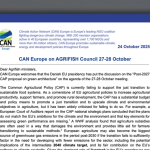16 July 2025 — Today, the European Commission presented its proposal for the next Multiannual Financial Framework (MFF), laying out a draft of the spending priorities for the EU’s 2028–2034 budget cycle. This proposal marks the beginning of a long process—and Climate Action Network (CAN) Europe will be following every step ahead, advocating for a package that puts people and the planet first.
Chiara Martinelli, Director of CAN Europe, said:
“Every single budgetary decision from now to 2040 is vital for our planet. Despite some positive elements, the Commission’s proposal falls short in ensuring that the EU’s next long-term budget contributes enough to filling the additional investments needed for achieving ambitious climate targets, as well as closing the biodiversity spending gap. This is only the start of the negotiations, meaning there is a lot of work ahead for building the support for the substantial changes needed before we are in 2028.”
Although it is undoubtedly positive that the Commission is proposing a €2 trillion-strong EU budget in current prices, out of which €700 billion would be earmarked for green investments, adjusted for inflation, this represents a reduction compared to the current EU budget period. In 2018 prices, the 2021-2027 budget, with the post-COVID-19 recovery fund Next Generation EU, has earmarked a total of €577.5 billion for green objectives, which in 2025 prices translates into €750.2 billion. In short, despite headline figures, the current proposal fails to increase available finance for climate and other environmental objectives.
This is why CAN Europe continues calling for a €2-trillion EU budget that earmarks €1 trillion (50%) in constant prices for closing the climate and biodiversity investment gaps, decarbonising our industries and ensuring sufficient spending for a socially just transition.
Beyond headline figures, to ensure that the next MFF truly contributes to meeting the EU’s 2040 climate and nature targets, it is essential to build on the three core qualitative principles established in the current long-term budget. First, EU funds should have accurate horizontal mainstreaming targets and earmarking for climate and nature; second, investments financed via EU funds should, at minimum, avoid undermining climate and nature targets through a more robust implementation of the ‘Do No Significant Harm’ (DNSH) principle, including the permanent exclusion of fossil fuel finance in the EU budget; and third, dedicated finance for a socially just transition should be protected and expanded.
Olivier Vardakoulias, Senior Finance and Subsidies Policy Coordinator at CAN Europe, said:
“The three core principles are not fully respected in this proposal. While we welcome a 35% climate mainstreaming target, there seems to be no distinct binding earmarking for biodiversity and other environmental objectives. In total, a 50% green mainstreaming target would be necessary for tackling all environmental objectives. Safeguards, such as the ‘Do No Significant Harm’ principle, are riddled with exceptions. The proposed methodology for tagging “green investments” entails significant risks of greenwashing, and ‘exemptions’ open the door to fossil fuel subsidies through loopholes. On top of this, the Just Transition Fund is scrapped and merged into much broader ‘National and Regional Partnership Plans’ without a clear earmarking of funds for regions in transition. The next EU budget must close the door on dirty investments, deliver real green funding, and support a just transition for all.”
Further quotes from CAN Europe experts
On Competitiveness Fund, Greg van Elsen, Senior Industrial Policy Coordinator at CAN Europe, said:
Calling the proposed Competitiveness Fund a ‘Draghi Fund’ misrepresents its content and ambition, as it falls far short of delivering the industrial transformation Europe urgently needs with targeted investments. Not even one-fifth of its resources are dedicated to this crucial shift. Moreover, the current proposal lacks strategic focus and sufficient safeguards. To ensure the fund truly supports a green and just transition, stronger conditionalities and more inclusive governance are essential. This means fully excluding fossil fuel industries from the Competitiveness Fund and prioritising investments in electricity grids, renewables-based electrification and resource efficiency. While skills and SME support are mentioned, the proposal lacks binding social requirements, including labour rights, just transition measures and profit-sharing mechanisms. Civil society and academia must have a formal role in decision-making, with steps toward an independent authority to guide and monitor EU industrial support.
On the Global Europe regulation and horizontal provisions proposals, Rachel Simon, International Finance & Development Senior Policy Coordinator at CAN Europe, said:
“€200 billion for Global Europe is hugely important for the EU’s role in the world. But without better principles and targets, the Commission risks steering vital global funds toward short-term interests, instead of real partnerships with developing countries to support them in building climate-resilient, future-fit economies. A binding 50% climate and environment target should govern Global Europe to address the destabilising impacts of extreme weather, expand renewable energy access, and support just transition in the Global South. Loopholes in the horizontal principles governing the regulation could allow EU funds to flow into fossil fuel projects abroad—this would be a dangerous step backwards for the EU’s climate commitments.”
On the proposals for new own resources, Isabelle Brachet, Senior Just Transition & Fiscal Policy Coordinator at CAN Europe, said:
“The Commission proposals for new own resources are essential to avoid a dangerous funding cliff post-2027. For example, taxes on e-waste and the turnover of large corporations are steps in the right direction, but they won’t be enough to fill the investment gap for climate and nature. We are disappointed that bolder proposals are missing from the list: fossil fuel profits tax, extreme wealth tax, frequent flyer levy or financial transaction tax. These could raise serious revenue while making polluters and the ultra-rich pay their fair share. If the Commission won’t take the lead, Member States must step up and bring these options to the Council table.”
For media requests and further comments:
Jani Savolainen, jani.savolainen@caneurope.org, +358 504667831
Further resources:
- Interactive tool: Where do the Green Investments go in the EU’s 2021-2027 long-term budget?
- Joint Statement: A social and green investment plan for a prosperous Europe
- Open letter: Support a Next Generation 2.0 fund to finance a more resilient, prosperous, sustainable and inclusive Europe
- Joint Statement: Operationalising the ‘Do No Significant Harm’ principle in the next long-term EU budget
- Progressive Taxation Options as EU Own Resources
- Letter: European Commission to uphold climate, nature and public health priorities in the next EU budget
- Policy Brief: External Action in the next Multiannual Financial Framework (MFF)
- MFF Hub recommendations on external action
- CAN Europe position on the Clean Industrial Deal
- CAN Europe policy brief on 2024 fossil fuel subsidies in the EU



